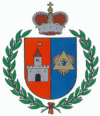Kalvarija, Lithuania
| Kalvarija | ||
|---|---|---|
| City | ||

Church in Kalvarija
|
||
|
||
| Location of Kalvarija | ||
| Coordinates: 54°25′0″N 23°13′0″E / 54.41667°N 23.21667°ECoordinates: 54°25′0″N 23°13′0″E / 54.41667°N 23.21667°E | ||
| Country |
|
|
| Ethnographic region | Suvalkija | |
| County | Marijampolė County | |
| Municipality | Kalvarija Municipality | |
| Eldership | Kalvarija eldership | |
| Capital of |
Kalvarija Municipality Kalvarija eldership |
|
| First mentioned | 1667 | |
| Granted city rights | 1791 | |
| Population (2005) | ||
| • Total | 5,066 | |
| Time zone | EET (UTC+2) | |
| • Summer (DST) | EEST (UTC+3) | |
Kalvarija (![]() pronunciation ) is a city in southwestern Lithuania, located in the Marijampolė County, close to the border with Poland.
pronunciation ) is a city in southwestern Lithuania, located in the Marijampolė County, close to the border with Poland.
Variants of the name include Kalvarijos, Kalvariya, Kalwarja, Kalvarye (Yiddish), Kalwaria (Polish), Kalvarien (German), Calvaria, Kalvaria, Kalwariya, and Kalwarya. The town is named after Golgotha also known as Calvary.
In 1705 the first wooden church was built. In 1713, local Jews received permission from King August II to build a synagogue and Jewish craftsmen were first permitted to practice their crafts without having to be members of the craft guilds. In 1791 Stanisław August Poniatowski recognized that Kalvarija had the right to call itself a town and confirmed the municipality's coat of arms. Kalvarija developed rapidly when the new St. Petersburg–Warsaw road was constructed at the beginning of the 19th century. 1840 saw the construction of a new Catholic church, which still stands today. By the outbreak of World War I, Kalvarija had over 10,000 inhabitants; the destruction of two-thirds of the town during the war caused the population decline. During World War II, in 1941, a mass execution of 38-150 Jews of the city was perpetrated by Lithuanians nazis.
...
Wikipedia


